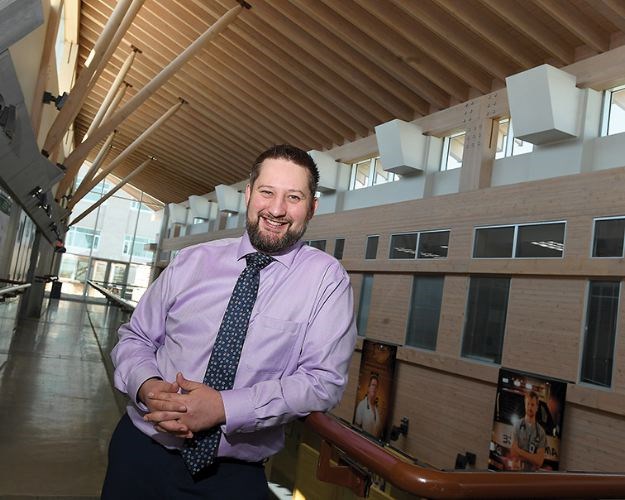Avid Citizen readers may recall the 2014 story of Baby Shea, the Prince George infant stricken with a rare and painful skin disorder. Known as "butterfly syndrome," it made his skin so sensitive that even the slightest friction gave him blisters.
Born in December 2013, he died a scant eight months later and in the aftermath his father, Bryn Fell, had a choice to make - either "crawl into a dark hole or do something momentous."
Fast forward five years and Fell is among the latest crop of students to graduate from the Northern Medical Program.
"This legacy is for him," Fell said Friday just prior to a celebration at the University of Northern British Columbia.
Born and raised in Terrace, Fell graduated from the community's high school in 2000. He enrolled at UNBC and by 2005 had completed a degree but remained unsure about what he wanted to do.
He had applied three times to get into the NMP only to be rejected on each and every occasion. By the time Shea was born to him and wife Christy, Fell was just about to complete a diploma in radiography but their lives were put on hold as Shea was taken to B.C. Children's and Women's Hospital in Vancouver.
Inspired by what he had seen in terms of the care their son was given, Fell decided to give the NMP one more try. Those who decide who gets admitted saw something in Fell they hadn't seen before.
"This time, I had a reason, I had a story, I had something that I was able to really speak to as for my passion for medicine and why I was hoping to be able to pursue it as a career," he said.
It's been a busy few years for Fell and his wife. To go along with all the rigours for both husband and wife of getting through medical school, they're now parents of a three-year-old girl, Callie and a two-and-a-half-month-old son, Kaidin.
Fell said he had plenty of support along the way, from his wife, his fellow students and guiding physicians and instructors.
"There are a lot of resources that they invest in us as students beyond the tuition we pay and so there is a lot of passion from faculty and others to make sure that we're as successful as possible," he said.
Fell is working towards becoming a general practitioner in the field of family medicine.
"I love the diversity, I love the fact that especially in rural or northern communities, you can have such a broad and varied practice in family medicine," he said. "You can have your clinic, you can have emergency, you can do mental health, drug and alcohol support, you can work in the operating room assisting general surgeons. The scope is massive."
Now 36 years old, Fell has two years of residency to go and he is among the lucky ones to land a spot in Prince George. He will be working under Dr. Gerrard Prigmore and Dr. Stephan Ferreira out of the Two Rivers Medical Clinic.
He said the process of getting a residency is very similar to applying for medical school. It involves drafting a resume, getting references and supporting documentation and then submitting an application to the Canadian Resident Matching Service for the residencies the student is interested in.
A review of the student's file and an interview follow, from which the residency programs rank their preferred candidates. The students also rank their preferences and an algorithm is used to make the closest match.
"The challenge is that there are only so many residency spots in a given field," Fell said. If there are more applicants than spots, he said someone might not get their first choice and either be left without a residency for the time being or be forced to move to another community.
Fortunately for Fell, he got his first choice. Fell will spend most of his first year at University Hospital of Northern B.C., although he will be in the office for a few hours each week.
In all, 33 students received a wood shingle and long white coat to mark their graduation. Eleven of them are from northern B.C., including eight from Prince George.
Fifteen of the them will be entering family medicine residency programs, with most training in rural and smaller centres in B.C. and across the country according to the NMP. Fell is among three who will train in Prince George.
The remaining 18 will pursue specialties such as diagnostic radiology, neurosurgery and orthopedic surgery.



